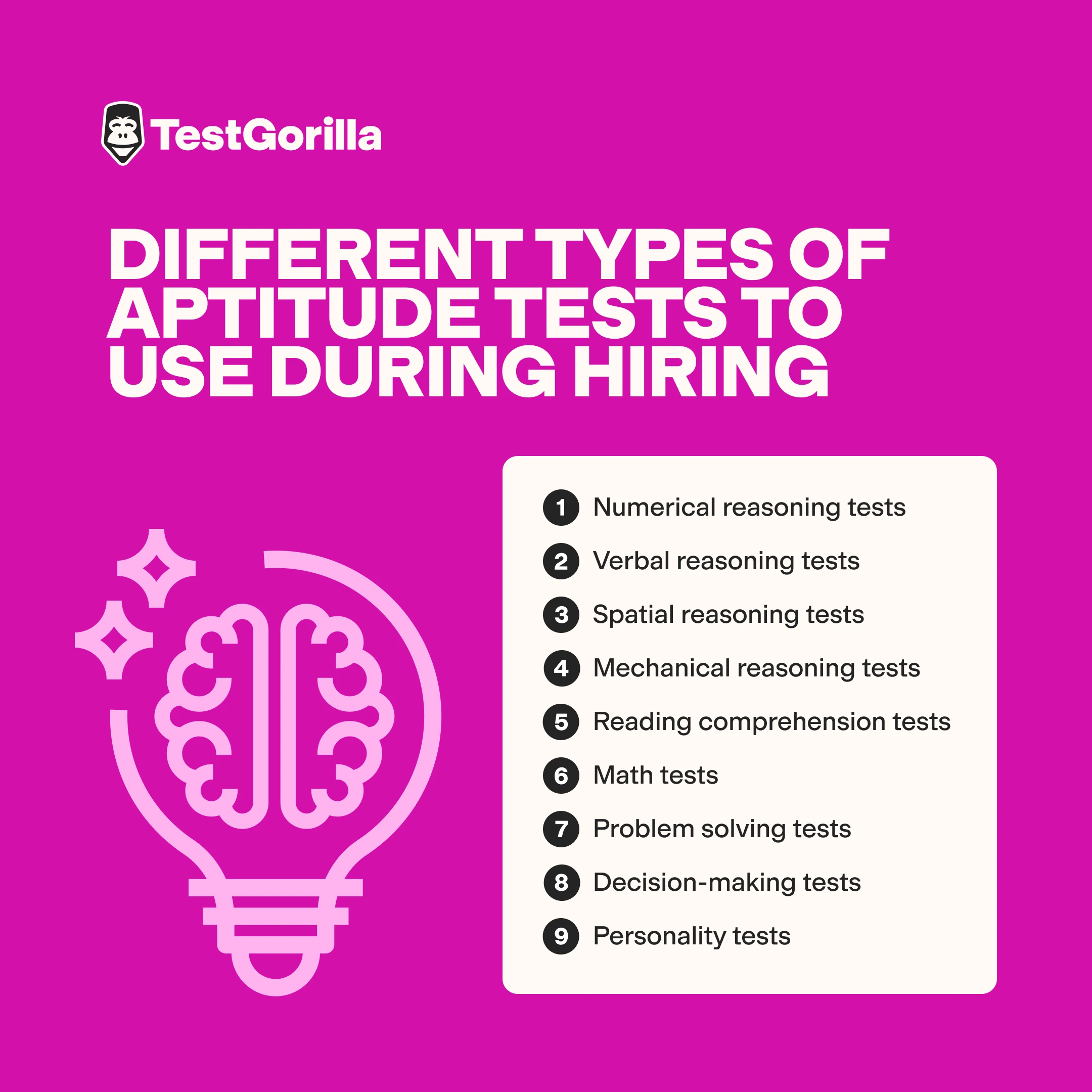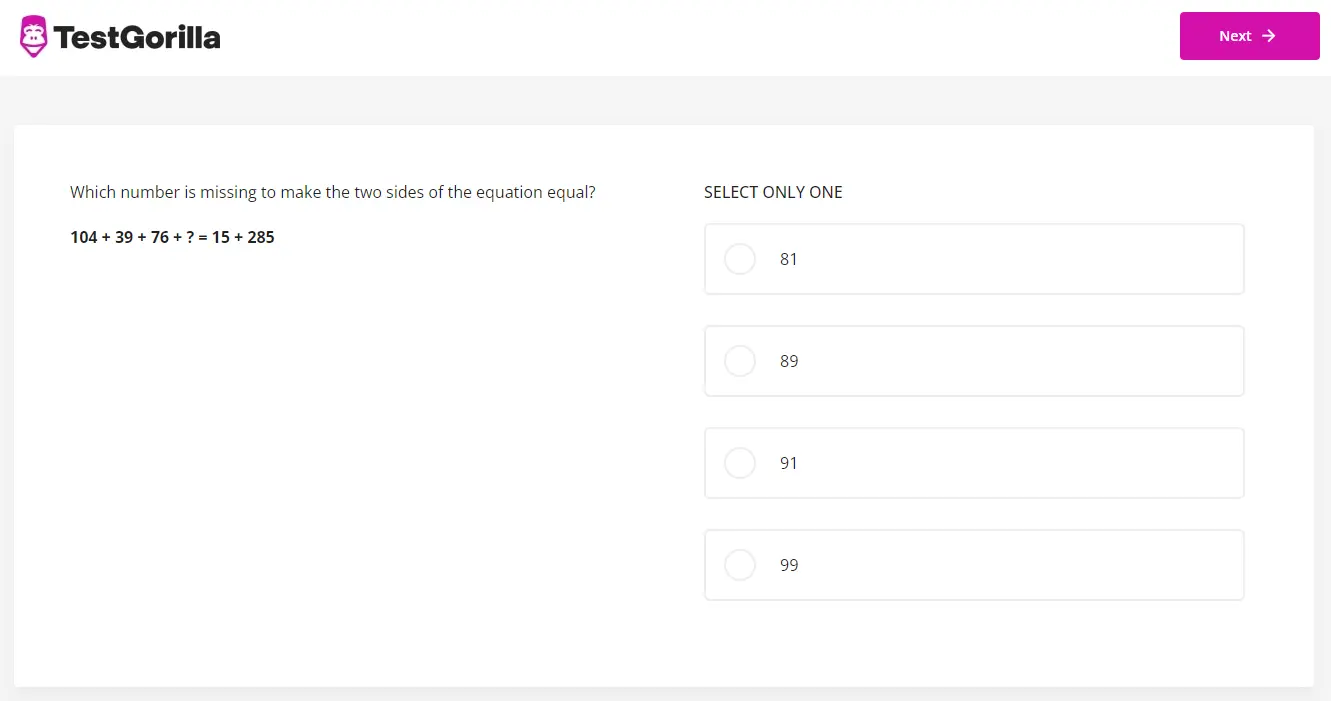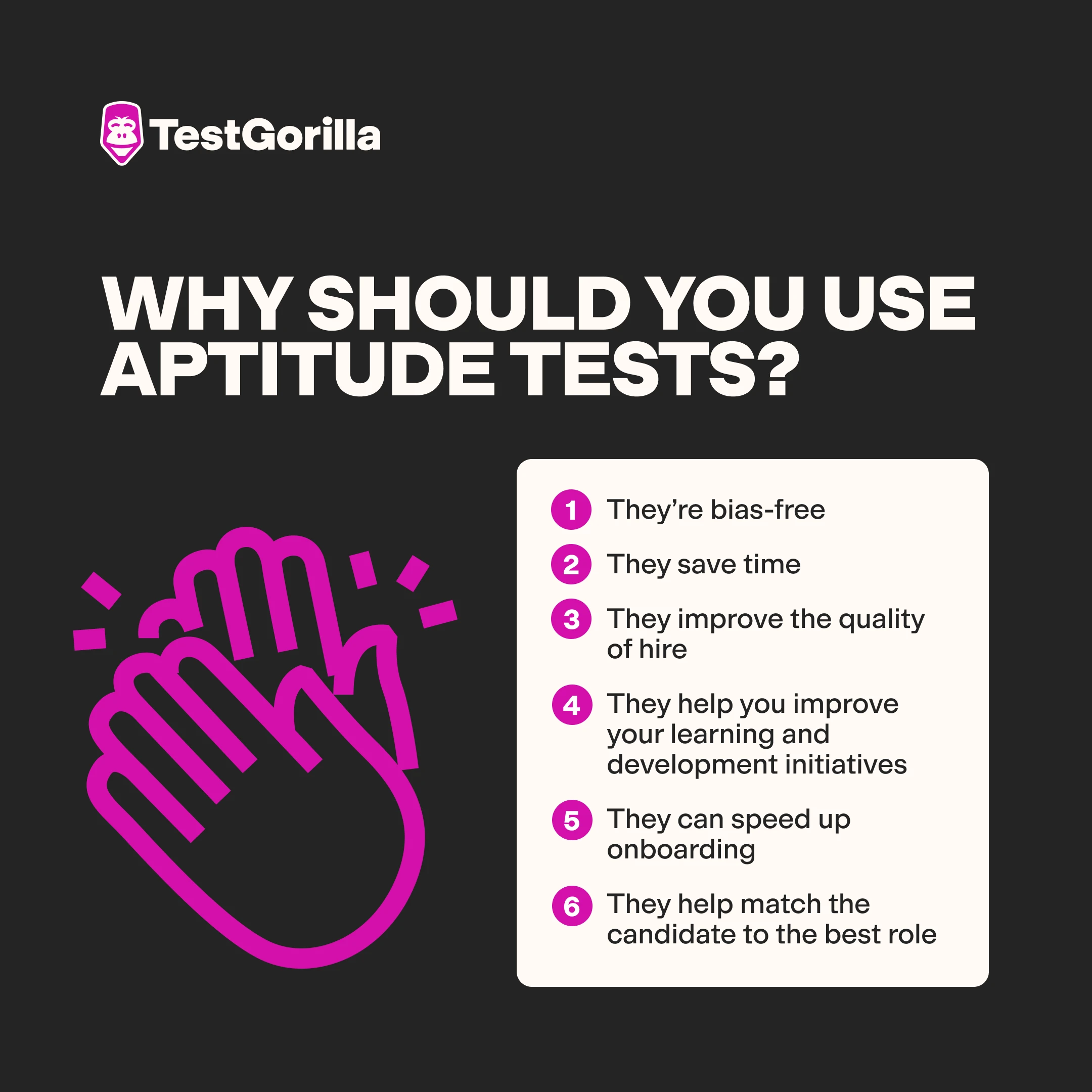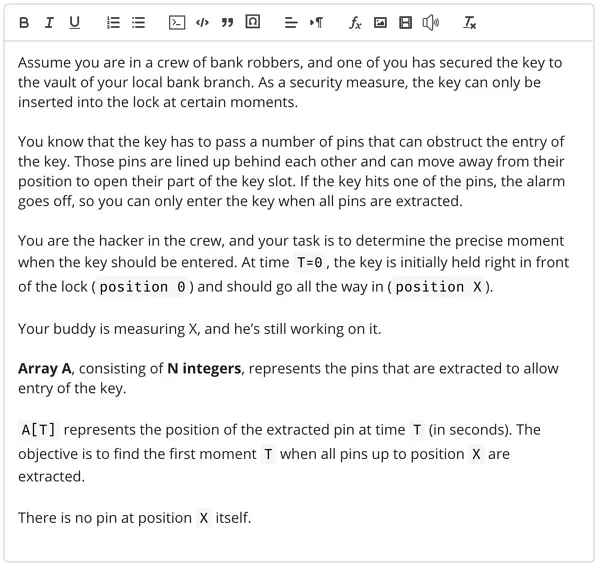Types of aptitude tests: Everything you need to know
Use skills tests to spot the best talent
Aptitude tests are transforming hiring, delivering a shortlist of skilled candidates without bias and in a fraction of the time of traditional resume screening.
But there is an art to choosing the aptitude test categories that deliver the right hire, and with a library of different types of aptitude tests before you, where do you even start? What is an aptitude test going to do for your hiring process anyway?
In this article, we discuss the benefits of different types of aptitude tests for employment and provide aptitude assessment test examples for different scenarios.
Table of contents
What are aptitude tests?
Aptitude tests (sometimes called cognitive tests) assess a candidate’s logical reasoning skills, mental abilities, and different types of intelligence.
So are aptitude tests IQ tests? In short, no. They measure different cognitive abilities but don’t measure “intelligence.” In fact, we don’t recommend using IQ tests in hiring.
Aptitude tests work wonders in the selection process, enabling hiring managers to easily assess applicants’ specific skills even before the interview stage. With the information the hiring managers receive from the aptitude tests, they can make better and more informed decisions.
Mis-hires can be expensive – the cost of hiring the wrong candidate can ramp up to $240,000 – so hiring managers need to make sure they hire the right person. Using cognitive tests is one of the best ways to do that.
Different types of aptitude test
There are many different types of aptitude tests you might use during hiring:
Numerical reasoning tests
Verbal reasoning tests
Spatial reasoning tests
Mechanical reasoning tests
Reading comprehension tests
Math tests
Problem solving tests
Decision-making tests
Personality tests
Below, we outline these types of aptitude test with examples of how you might use them during hiring. We also cover what is in an aptitude test from each category.
Numerical reasoning tests
With the digitalization of most professions and workplaces, numerical reasoning has become essential for many roles, especially in finance, marketing, product development, and customer success.
If an employee needs to interpret charts, graphs, diagrams, and tables, a numerical aptitude test enables hiring managers to determine whether they have the right skills for the position.
For instance, TestGorilla’s Numerical Reasoning test assesses candidates’ numerical abilities, including how they:
Interpret numbers, fractions, and percentages
Read graphs
Identify numerical patterns
Analyze numerical data
Draw insights from datasets
Here’s a numerical reasoning aptitude test multiple-choice question:
Verbal reasoning tests
If numerical reasoning is the skill of interpreting what numbers and numerical data “mean,” then verbal reasoning is the same for information that’s expressed through language.
A verbal logical reasoning test helps you assess whether the candidate has the necessary logical skills to analyze and understand the relationships between words and phrases presented in written form.
Here’s a verbal aptitude test example from TestGorilla’s Verbal Reasoning test.
Verbal reasoning skills are essential in the workplace. Many sub-skills, from solving problems to following instructions, fall under the larger category of verbal reasoning.
Verbal ability is especially important in the legal field, where you have to be able to form and dissect complex arguments, but they’re also important in areas like:
Marketing
Journalism
The public sector and policy-making
If you’re hiring in one of these fields, consider implementing types of aptitude tests that evaluate these skills – and if you’re looking for a job in these areas, practice verbal reasoning questions.
Spatial reasoning tests
A spatial reasoning test helps recruiters assess whether candidates can recognize the connections between two- and three-dimensional objects in space.
TestGorilla’s Spatial Reasoning test enables employers to assess candidates’ skills when it comes to mental rotation and folding, spatial visualization, and spatial working memory.
This is more important in some roles than others.
Most STEM-related (science, technology, engineering, and math) jobs require strong spatial reasoning skills. If your role falls into this category, asking applicants to take a spatial reasoning test can help you make a better hiring choice.
This includes roles like:
Mechanical or chemical engineer
Architect
Researcher
Other roles don’t require spatial reasoning skills in the same way. For example, you’re unlikely to see spatial reasoning types of aptitude tests in applications for writing jobs or web development roles.
Mechanical reasoning tests
A mechanical reasoning test evaluates candidates’ understanding of basic mechanical and physical concepts.
Candidates who score well on this test understand how forces work, how velocity impacts physical objects, and how pulleys, gears, and wheels function.
These are essential types of aptitude test for employment in roles like:
HVAC engineers
Carpenters
Plumbers
Automotive engineers
TestGorilla’s Mechanical Reasoning test enables you to assess your candidates’ understanding of pulleys, gears, wheels, forces, and general movement of physical objects.
Here’s an example question from our Mechanical Reasoning test:
To answer correctly, candidates need a basic understanding of levers and fulcrums.
Use aptitude tests to hire skilled candidates
See firsthand how you can find highly skilled candidates with our bias-free, objective talent assessments.
Reading comprehension tests
Reading comprehension skills are often evaluated alongside verbal reasoning skills, but they’re slightly different.
Verbal reasoning skills refer to the general ability to analyze and spot patterns in verbal information – for instance, recognizing that a group of words all rhyme or share the same meaning.
On the other hand, reading comprehension refers to the ability to retain information from a specific text and understand its meaning.
Reading comprehension is crucial in today’s workplace, where communication often takes the form of emails, chats, and memos.
This is important for many office-based roles, but especially when hiring for:
Writers and editors
Analysts
Managers
English reading comprehension types of aptitude tests give candidates a short passage to read and answer questions about. If a candidate answers these questions correctly, it shows hiring managers that they have the analytical skills to interpret written information correctly.
Math tests
Math tests help you assess whether candidates can do basic and advanced mathematical operations. This is extremely useful when roles require working with finances in any form, such as:
Accountants
Cashiers
Computer programmers
Auditors
Of course, different roles require different levels of mathematical aptitude. A statistician, for example, needs a strong understanding of complex mathematical principles, whereas an office manager may only need basic arithmetic skills.
That’s why at TestGorilla, we offer multiple types of aptitude tests to assess the mathematical literacy of your candidates:
Basic Double-digit Math test
Basic Triple-digit Math test
Intermediate Math test
Here’s a Basic Triple-digit Math test example question:
Problem solving tests
One of the most valuable skills an employee can have is the ability to solve problems independently. This type of critical thinking comes in handy in any number of situations, including:
Resolving a scheduling conflict
Prioritizing the tasks on a to-do list
Working out how to deliver a project on time despite setbacks or delays
Here’s an example from TestGorilla’s Problem Solving test, which helps you see whether the candidate can analyze information to make the right decisions:
Naturally, these situational judgment tests are especially useful for management jobs (for instance, project managers and those organizing shift workers).
However, it is also important in many analytical roles. Data analysts and web developers, for example, often need problem-solving skills to find workarounds during complex coding tasks.
Decision-making tests
The pace of digital business means that many employees can’t wait for a manager’s approval before starting their work.
Take sales: Digital salespeople must often make on-the-spot decisions to secure clients or else risk losing them to competitors who are only a short video call away.
This requires employees to understand:
The company’s overall strategic goals
The different factors at play in their decision, like market forces
The financial impact of their decisions
To ensure employees are equipped for the task, top employers use aptitude test categories to evaluate whether candidates can consistently make the right decisions and assess how employees approach the decision-making process.
TestGorilla’s Business Judgment test is an example of these types of aptitude test and is best suited for evaluating advanced decision-making, such as when hiring a strategic director.
Personality tests
It’s essential for an organization to hire people who share the same values and outlook toward the world and life; the bigger the convergence of values, the more the employee feels “at home” in the company.
Personality tests can help you here.
These are not strictly types of aptitude tests because they don’t measure abilities, only personality traits and predispositions. However, you can use them in conjunction with other types of aptitude tests to make better hiring decisions.
The best way to use personality tests during hiring is to look not for someone who replicates the qualities of your existing team but for someone who shares the company’s values and can add to the company’s culture.
In other words, don’t look for culture fit; look for culture add instead.
TestGorilla offers many different types of aptitude test to assess candidates’ personalities and how they act at work.
Sign up for our Free Forever plan to instantly access our:
Enneagram personality test
16-personalities test
DISC test
Big 5 (OCEAN) test
Or check out our Motivation test, available in our premium plans, which measures whether candidates’ preferences align with your organization and the role you’re hiring for.
Why should you use aptitude tests?
Many professions have been using technical aptitude tests during hiring for a long time; however, this has often been confined to STEM professions like engineering.
This is a mistake. Evidence suggests that skills-based hiring, which advocates for using different kinds of aptitude tests instead of resumes, is more effective than traditional methods.
In fact, Deloitte found that skills-based organizations were almost twice as likely to retain high performers and more than twice as likely to innovate.
Here are a few reasons why aptitude tests are more effective than traditional hiring:
They’re bias-free. One study found the number of women hired into senior roles increased by nearly 70% when recruiters used skills-based hiring.
They save time. Screening resumes to create a shortlist wastes precious time; skills tests enable you to automatically create unbiased shortlists based on proven skills.
They improve the quality of hire. Research shows pre-hire work experience, like what you might see on a resume, is a poor predictor of job performance and retention, whereas skills tests directly measure candidates’ aptitude for the role.
They help you improve your learning and development initiatives by showing you areas for improvement in candidates’ skill sets before they even start the role.
They can speed up onboarding by showing you how candidates learn. For instance, a candidate who scores highly for agreeableness and openness on the OCEAN personality model (“Big Five”) test is likely to prefer gamified onboarding.
They help match the candidate to the best role by showing you their raw skills, which you might notice fit another open role better than the one at hand.
Unlock the power of talent assessments with TestGorilla
Use our talent assessments to avoid bias, reduce time to hire, and improve recruiting efficiency.
How to use different kinds of aptitude tests in recruitment
Let’s run through a simple example of using different types of aptitude tests with TestGorilla to make the right hire, first time, every time.
In this example, you’re using coding aptitude tests to hire a software developer with the right competencies for the job role. Here are the basic steps:
Identify the most important skills to hire for. You can do this by testing your current development team to identify skills gaps – for example, you might find you have a deficit of project management skills. You can also test high performers across your company to spot commonalities, like problem-solving abilities and communication skills.
Browse our test library to identify the kinds of aptitude test to include. Types of aptitude tests for programmers include Python coding tests, JavaScript coding tests, and TypeScript coding tests
Consider which level of skills you require. A head developer is likely to need advanced skills, while a junior developer needs basic or intermediate skills.
Create the assessment. You can use our Essential Skills template, customize our ready-made Web Developer assessment, or create your own custom test.
Next, add the types of aptitude tests you want to use:
For best results, add your own custom coding question to tailor the assessment to get the exact skills you need. Make sure to clearly state the context of the task and the overall goal. Here’s an example of what that might look like:
Finish and publish the test and share it widely.
When you have received a sufficient number of applications, you can then create an automatic shortlist of candidates based on objective data and test results.
The results could be transformative. Our client Orbit Technologies halved new hire attrition in their engineering team after switching to TestGorilla.
Use all types of aptitude test to sharpen your hiring with TestGorilla
In this blog post, we’ve shown you many different types of aptitude tests with examples of how to use them in hiring.
From numerical reasoning skills to personality traits, there are aptitude tests for employment in any industry or role.
Don’t waste time getting started.
Take a product tour today to see which kinds of aptitude tests we have on offer.
To see how they could work for you, sign up for a demo or for our Free Forever plan.
Types of aptitude test FAQs
Are you still unsure what aptitude test categories would work for you or what the differences are between different types of aptitude tests? Here are the answers.
What is an aptitude test for a job?
An aptitude test for a job is an online psychometric test designed to measure candidates’ aptitude for different skills that are relevant to the role they’re applying for. One common aptitude test example is a numerical reasoning test, which measures how well candidates process numerical information.
What is a technical aptitude test?
A technical aptitude test is a psychometric test that evaluates candidates’ abilities in areas usually designated as “hard skills.” These include aptitude test categories like numerical reasoning tests, mechanical reasoning, and math.
These types of aptitude tests complement testing in “soft-skill” areas like communication and personality testing.
What is the difference between an aptitude test and an ability test?
The difference between aptitude tests and ability tests is subtle, and you may find the terms being used interchangeably. Generally speaking, ability tests measure the deeper natural ability underlying certain tasks – for example, natural spatial reasoning skills underlie the ability to plan how objects fit in a space.
Aptitude tests measure how a candidate applies these to real problems. In the above example, a spatial reasoning aptitude test might show you an image of a 3D object and identify in a lineup an image of that object from a different angle.
What are the most common aptitude tests?
The most common types of aptitude test to encounter during the recruitment process are verbal reasoning tests, which evaluate the individual’s ability to process linguistic information, and numerical reasoning tests, which assess how well you can process numerical information.
Other common types of tests are spatial reasoning tests, decision-making tests, abstract reasoning tests, and personality tests.
Related posts
Hire the best candidates with TestGorilla
Create pre-employment assessments in minutes to screen candidates, save time, and hire the best talent.
Latest posts
The best advice in pre-employment testing, in your inbox.
No spam. Unsubscribe at any time.

Hire the best. No bias. No stress.
Our screening tests identify the best candidates and make your hiring decisions faster, easier, and bias-free.
Free resources
This checklist covers key features you should look for when choosing a skills testing platform
This resource will help you develop an onboarding checklist for new hires.
How to assess your candidates' attention to detail.
Learn how to get human resources certified through HRCI or SHRM.
Learn how you can improve the level of talent at your company.
Learn how CapitalT reduced hiring bias with online skills assessments.
Learn how to make the resume process more efficient and more effective.
Improve your hiring strategy with these 7 critical recruitment metrics.
Learn how Sukhi decreased time spent reviewing resumes by 83%!
Hire more efficiently with these hacks that 99% of recruiters aren't using.
Make a business case for diversity and inclusion initiatives with this data.































